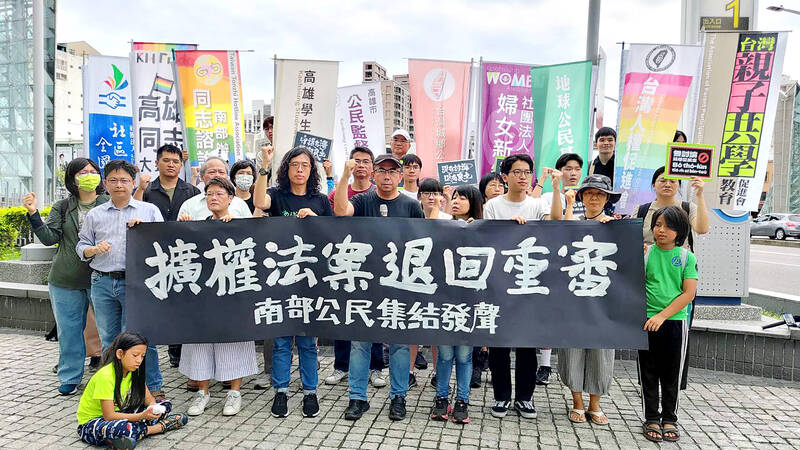Dozens of legal experts yesterday released a statement calling on lawmakers to return five controversial legislative reform bills to committee for deliberation, and to consult more broadly with experts and the public to establish a consensus before passing the bills.
The Legislative Yuan is today scheduled to vote on a set of reform bills proposed by opposition lawmakers. All but one have already been voted through to the third and final reading, which might be held today.
The bills seek to expand the legislature’s powers of investigation, including imposing fines on government officials, civil organizations and private individuals for failing to cooperate at hearings.

Photo: CNA
Another provision would impose a prison sentence of up to a year on public officials for lying during legislative hearings.
Procedural flaws and the unconstitutional content of the bills have led to heated conflict in the legislature and mass protests nationwide, the letter’s 39 signatories said.
“As legal experts, we call on the legislature to halt the second reading of the five reform bills and return them to committee for thorough review,” they said.
The Constitution does not explicitly grant the Legislative Yuan investigative powers, which are instead governed by four constitutional interpretations: Nos. 325, 585, 633 and 729, they said.
No. 585 states that the legislature “may exercise a certain power of investigation,” but “under the principles of separation of powers and checks and balances, the scope of the targets or matters subject to the Legislative Yuan’s investigative power does not grow unchecked.”
The bills not only involve the balance of power between the legislature and executive, but also restrict the rights of the general public, the statement says.
The interpretation addresses this.
“The constitutional principles of proportionality, clarity and definitiveness of law, as well as due process of law, must all be complied with where such procedures may involve any restrictions imposed upon the rights of the people,” it says.
The bills’ proposed methods of forcing people to cooperate with investigations infringe on their personal liberties, the experts said.
They also lack sufficiently clear explanations of the scope, purpose, means, procedural guarantees, remedies and other necessary details, they said, adding that this would lead to numerous problems.
There is also a difference between the legislature’s powers of interpellation and investigation, they said.
The former is intended to provide lawmakers information on which to base votes or statements, while the latter is for the legislature to obtain facts necessary to carry out its constitutional responsibility of passing laws and budgets, the experts said.
Whether they merit the same level of punishment for disrupting should be carefully considered, they added.
The experts called on lawmakers not to rush to a vote this week so that opinions from all sectors can be considered to craft a more complete set of bills.
However, if they are passed, the experts asked the Cabinet and president to return the bills to the legislature for reconsideration.

The CIA has a message for Chinese government officials worried about their place in Chinese President Xi Jinping’s (習近平) government: Come work with us. The agency released two Mandarin-language videos on social media on Thursday inviting disgruntled officials to contact the CIA. The recruitment videos posted on YouTube and X racked up more than 5 million views combined in their first day. The outreach comes as CIA Director John Ratcliffe has vowed to boost the agency’s use of intelligence from human sources and its focus on China, which has recently targeted US officials with its own espionage operations. The videos are “aimed at

STEADFAST FRIEND: The bills encourage increased Taiwan-US engagement and address China’s distortion of UN Resolution 2758 to isolate Taiwan internationally The Presidential Office yesterday thanked the US House of Representatives for unanimously passing two Taiwan-related bills highlighting its solid support for Taiwan’s democracy and global participation, and for deepening bilateral relations. One of the bills, the Taiwan Assurance Implementation Act, requires the US Department of State to periodically review its guidelines for engagement with Taiwan, and report to the US Congress on the guidelines and plans to lift self-imposed limitations on US-Taiwan engagement. The other bill is the Taiwan International Solidarity Act, which clarifies that UN Resolution 2758 does not address the issue of the representation of Taiwan or its people in

US Indo-Pacific Commander Admiral Samuel Paparo on Friday expressed concern over the rate at which China is diversifying its military exercises, the Financial Times (FT) reported on Saturday. “The rates of change on the depth and breadth of their exercises is the one non-linear effect that I’ve seen in the last year that wakes me up at night or keeps me up at night,” Paparo was quoted by FT as saying while attending the annual Sedona Forum at the McCain Institute in Arizona. Paparo also expressed concern over the speed with which China was expanding its military. While the US

SHIFT: Taiwan’s better-than-expected first-quarter GDP and signs of weakness in the US have driven global capital back to emerging markets, the central bank head said The central bank yesterday blamed market speculation for the steep rise in the local currency, and urged exporters and financial institutions to stay calm and stop panic sell-offs to avoid hurting their own profitability. The nation’s top monetary policymaker said that it would step in, if necessary, to maintain order and stability in the foreign exchange market. The remarks came as the NT dollar yesterday closed up NT$0.919 to NT$30.145 against the US dollar in Taipei trading, after rising as high as NT$29.59 in intraday trading. The local currency has surged 5.85 percent against the greenback over the past two sessions, central